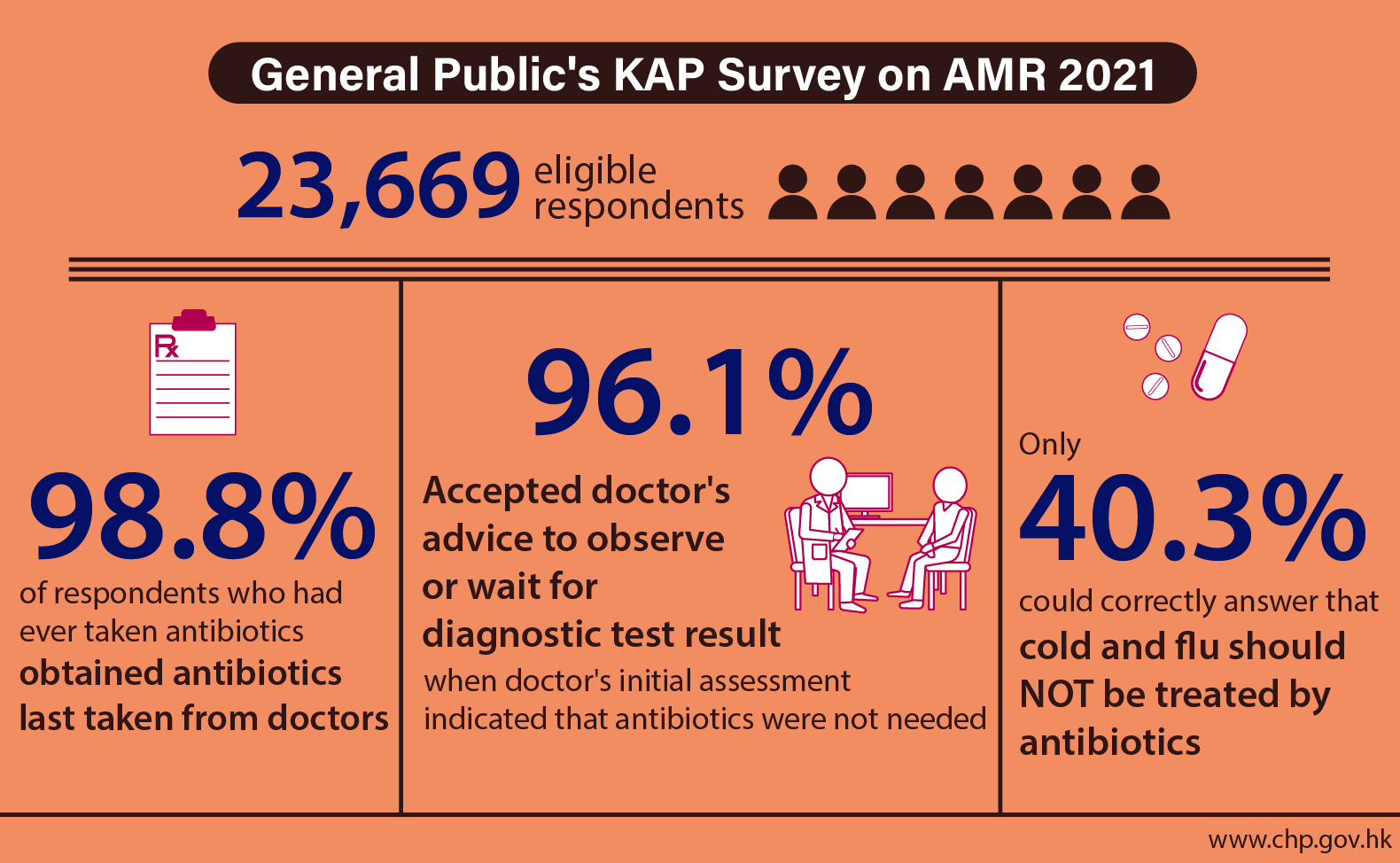General Public's Knowledge, Attitude and Practice Survey on Antimicrobial Resistance 2021
Release date: 17 November 2022
General Public's Knowledge, Attitude and Practice Survey on Antimicrobial Resistance 2021

Introduction
The Centre for Health Protection (CHP) commissioned Census and Statistics Department (C&SD) to conduct this territory-wide survey by joining the Thematic Household Survey 2021, in order to gauge the general public’s knowledge, attitude and practice (KAP) on Antimicrobial Resistance (AMR).
Research Methodology
The target respondents of this household survey were Cantonese, Putonghua or English-speaking non-institutional Hong Kong residents (excluding foreign domestic helpers) aged 15 or above. A bilingual (Chinese and English) questionnaire was used to collect data by face-to-face interview. Fieldwork took place between 28 September 2021 and 27 December 2021. A total of 23 669 eligible respondents from 10 057 households completed the interview. The response rate was 75.2%.
Key Findings
- Among those respondents who had ever taken antibiotics, a vast majority of them (98.8%) reported they obtained their antibiotics last taken from a doctor.
- Among respondents (13.9%) who reported that they had consulted a doctor (for cold or flu) in the past 12 months, only a very small proportion of them (5.7%) had asked for antibiotics during that consultation.
- When a doctor‘s initial assessment indicated that antibiotics are not needed, the vast majority of respondents (96.1%) would accept the doctor’s advice to observe for a few more days or to wait for the diagnostic test result before deciding whether to prescribe antibiotics or not.
- Less than half of all respondents (40.3%) correctly answered that cold and flu should not be treated by antibiotics.
- The majority of respondents (60.4%) wished their doctor to share decision making on antibiotics prescription with them.
- A large proportion of respondents have heard of the respective terms of superbugs (超級細菌) (65.5%), and antibiotic resistance (抗生素耐藥性) (56.7%) in either Chinese or English.
- A large proportion of responders correctly understood the severity of AMR: Many infections are becoming increasingly resistant to treatment by antibiotics (73.9%); If bacteria are resistant to antibiotics, it can be very difficult or impossible to treat the infections they cause (64.6%).
- Nevertheless, less than half of respondents correctly answered that AMR was not only a problem for people who took antibiotics regularly (35.2%); and bacteria which were resistant to antibiotics could be spread from person to person (37.2%).
- More than half of the respondents (61.0%) considered not much they could do to stop antibiotic resistance.
Recommendations
This survey showed that there was only less than half of the respondents knew that common cold and flu, should not be treated by antibiotics. Although viral diseases might develop complications like secondary bacterial infections, which should then be treated by antibiotics, antibiotics prescription is a clinical decision only to be made by doctors after consultation. Public should be further educated to always seek medical attention when feeling unwell.
There was only less than 40% of respondents knew that AMR was not only a problem for people who took antibiotics regularly; and bacteria which were resistant to antibiotics could be spread from person to person. In addition, more than half of the respondents considered not much they could do to stop antibiotic resistance, which reflected that most respondents considered AMR is only a "Somebody Else's Problem". Awareness-raising and education to the general public on AMR should be further strengthened.
This survey was conducted when the COVID-19 pandemic occurred when significant drop of antimicrobial use among private doctors and community pharmacies was recorded. The reduction might be due to decrease in respiratory infections including influenza and drop in health seeking behavior by the general public. The impact of COVID-19 pandemic on antimicrobial use and AMR has to be continually monitored.
The Way Forward
The second Hong Kong Strategy and Action Plan on Antimicrobial Resistance covering the years 2023-2027 was launched in November 2022, in which one of the priority interventions is to conduct regular survey with general public on AMR to inform strategies on health promotion. Continuous monitoring of KAP of general public through regular survey is essential for planning and evaluation of education and promotion activities.
The theme of the Antimicrobial Awareness Week 2022 organised by CHP is “Contribute Together to Combat Antimicrobial Resistance!” aims to highlight the messages on everyone has a role in combating AMR and to solicit people from different sectors in the community to join hand to minimise the development and spread of AMR. In order to enhance public’s knowledge and awareness on AMR and proper use of antibiotics, CHP also produced a series of health education and promotion resources based on the survey result.
The survey report can be accessed here.